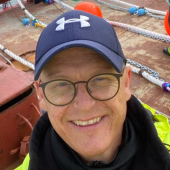
Disruptive technology to enable a scaling seaweed industry
Disruptive technology to enable a scaling seaweed industry
Kim Kristensen, Founder, CEO, Arctic Seaweed AS, Norway

Disruptive technology to enable a scaling seaweed industry
Kim Kristensen, Founder, CEO, Arctic Seaweed AS, Norway
About the speaker:
Kim has been involved with Seaweed starting in 2015 as a mentor to a founder in the ocean restoration industry. Shortly after the idea underwent some pivots, he became responsible for one of the first seaweed technology companies in Norway, Arctic Seaweed AS. Kim has built up Arctic Seaweed together with his team with a specific focus on combining technology and biology. He is on a mission to develop the missing pieces to scale the industry to a level where it is sustainable. Financially, technologically and from an environment perspective.
Company info:
Arctic Seaweed was established in 2016. The company has developed and tested an integrated and scalable solution for large scale seaweed farming and production. The company is currently expanding their production capacity to meet increasing market demands for farmed seaweed while at the same enabling other companies to scale up their own production by providing access to the company's technology.
Presentation:
Seaweed farming is not a new industry. But the current level of technology does not allow for proper scaling of production in Europe. The industry needs radical new solutions to disrupt the status quo. Arctic Seaweed is on a mission to develop these solutions to enable a sustainable seaweed industry to grow to maturity.
Interview:
1. When was the first time you got involved with seaweeds and why?
I first got involved with seaweeds in 2015 when I was mentoring a founder of a company developing artificial reefs for seabed rehabilitation. We established Arctic Seaweed together in 2016, aiming to use some of the results from the reef design and development into a seaweed farming concept.
2. What is your view on the European seaweed industry in 2030?
The EU has ambitious goals for the European seaweed industry. Seaweed is included in the farm to fork strategy and the aim is to grow the industry in Europe with a CAGR of 44% to a total of 9mn tons in 2030. That is only 7 harvesting cycles in the future and we need to push the bar to even get close to these numbers. I strongly believe that we will have a sustainable industry in place by 2030, but that is going to require massive efforts into R&D alongside significant investments into scaling up the entire value chain. But before we can start scaling we need to have a scalable technology base, a robust supply chain and reliable solutions in place.
3. What will you be talking about at Seagriculture EU 2023?
I will be talking about Arctic Seaweed and how we have been working towards a scalable technology platform for seaweed farming and production.